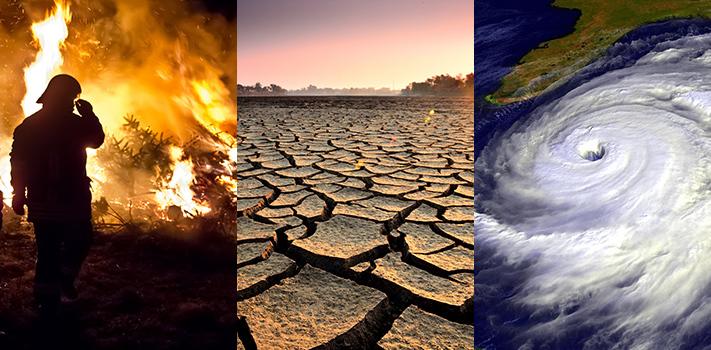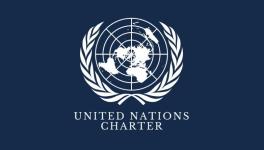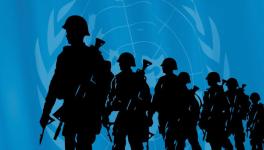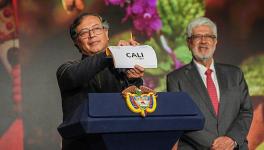Climate Change Conference Starts in Germany, Absence of US One of the Major Concerns

Credits: NASA
This year’s climate change conference has begun in Germany, presided over by the island state of Fiji. It is the 23rd Conference of the Parties (COP23) to the United Nations Framework Convention on Climate Change (UNFCCC). In 2015, at COP21, the Paris Agreement was adopted. The Agreement established targets for reducing emissions of greenhouse gases, mitigating and adapting to the effects of climate change, and financing developing countries to adapt to the effects of climate change. The actions specified in the Paris Agreement will go into effect in 2021.
This year’s conference will take the discussion and debate on the Paris Agreement ahead towards finalising the rules for the implementation of the agreement.
COP23 has started in the wake of a year of devastating climate events — floods, hurricanes, wildfires, droughts, heatwaves. Island states such as Fiji are amongst the worst affected by the climate catastrophes. They often have to grapple with losing land due to rising ocean levels, resulting in large-scale displacements. Fiji hosting the conference this year should instil a sense of urgency into the proceedings, which hopefully might translate into greater ambitions of mitigating global warming.
New data by NASA, UK Met Office, and the US Oceanic and Atmospheric Administration showed that the Earth's temperature is already 1.1 degrees above the pre-industrial revolution levels. The limit that was decided in the Paris Agreement is 2 degrees above the pre-industrial revolution levels, with countries agreeing that they will put in efforts to keep it below 1.5 degrees Celsius.
CO2 levels have risen to an unprecedented level as well. Atmospheric CO2 hit 410 parts per million (ppm) for the first time in human history. If it goes over 450ppm, there is only a 50% chance of being able to keep the rising global temperatures below 2 degrees.
There is a lot to be discussed in COP23. One major concern is the absence of the United States at this year’s talks. Donald Trump has sent in a small delegation since the US cannot completely pull out before 2020. It has been reported that the delegation plans on promoting nuclear energy and fossil fuels to combat climate change. While this is a worrying development, it should be noted that the US had not pledged any significant climate change action in the first place. Also, an unofficial delegation from the US, calling themselves the US People’s Delegation, will be present offering their support in the form of discussion, as well as finance. Former New York City mayor Michael Bloomberg has said he will pay the $15m in UNFCCC administration costs if the US government does not.
The Paris Agreement adopted in 2015 consisted of broad goals which the signatory countries agreed they will work towards, but the guidelines for achieving these goals still need to be decided in the form of the “rulebook”. They will specify what country needs to do what, and how. They also have to specify how the countries affected most by climate change, such as island states and developing nations, will adapt to the climate damage caused majorly by developed nations which have been utilising fossil fuels for their growth.
Each country has to pledge its contribution towards emissions reductions. These are known as ‘nationally determined contributions’, or NDCs. The current pledges fall way short of the requirements. According to the latest Emissions Gap Report by the United Nations Environment Programme, the NDCs pledged till now “cover only approximately one-third of the emissions reductions needed to be on a least-cost pathway for the goal of staying well below 2°C.”
The Report also states that if the emissions gap is not closed by 2030, it is extremely unlikely that the goal of holding global warming to below 2 degrees can be reached.
The major debate in finalising this rulebook is the lack of consensus in the interpretation of the Paris Agreement (PA) between developing and developed countries. Most of the developing countries want the guidelines to differentiate between developed and developing nations for the implementation of the PA, with flexibilities for the latter.
All the issues need to be resolved and the guidelines finalised by 2018, unless Parties agree to extend this deadline.
Another major issue of contention between developed and developing states is the focus on pre-2020 actions. Before the Paris Agreement, Parties to the UNFCCC had signed the Kyoto Protocol (KP). KP was active till 2013, leaving a gap of 7 years between the end of KP and the beginning of the Paris Agreement. In 2012, the Doha Amendment was passed which gave effect to the emissions reductions to be undertaken by developed countries in the 2013-2020 period. But very few countries ratified the Doha Amendment. The group Like-minded Developing Countries (LMDC) raised this issue to be discussed at this year’s conference, but no time was allotted to this topic in the conference agenda, sparking protests by India and China on the first day of the conference.
Another matter to be finalised before the Paris Agreement kicks in is the financing of loss and damage suffered by island states or developing nations due to climate disasters. Third World Network has reported that “developed countries are using procedural excuses to delay meaningful discussion on providing finance to developing countries on addressing loss and damage.” The discussion on financial instruments for loss and damage and making them accessible to different countries has been postponed to 2018 and 2019. An issue at COP23 will be if speedy progress will be made on finalising this process.
These are only some of the issues that are likely to come up at this year's conference. It remains to be seen if any significant progress is made towards combative climate change action.
(with inputs from Third World Network)
Get the latest reports & analysis with people's perspective on Protests, movements & deep analytical videos, discussions of the current affairs in your Telegram app. Subscribe to NewsClick's Telegram channel & get Real-Time updates on stories, as they get published on our website.























